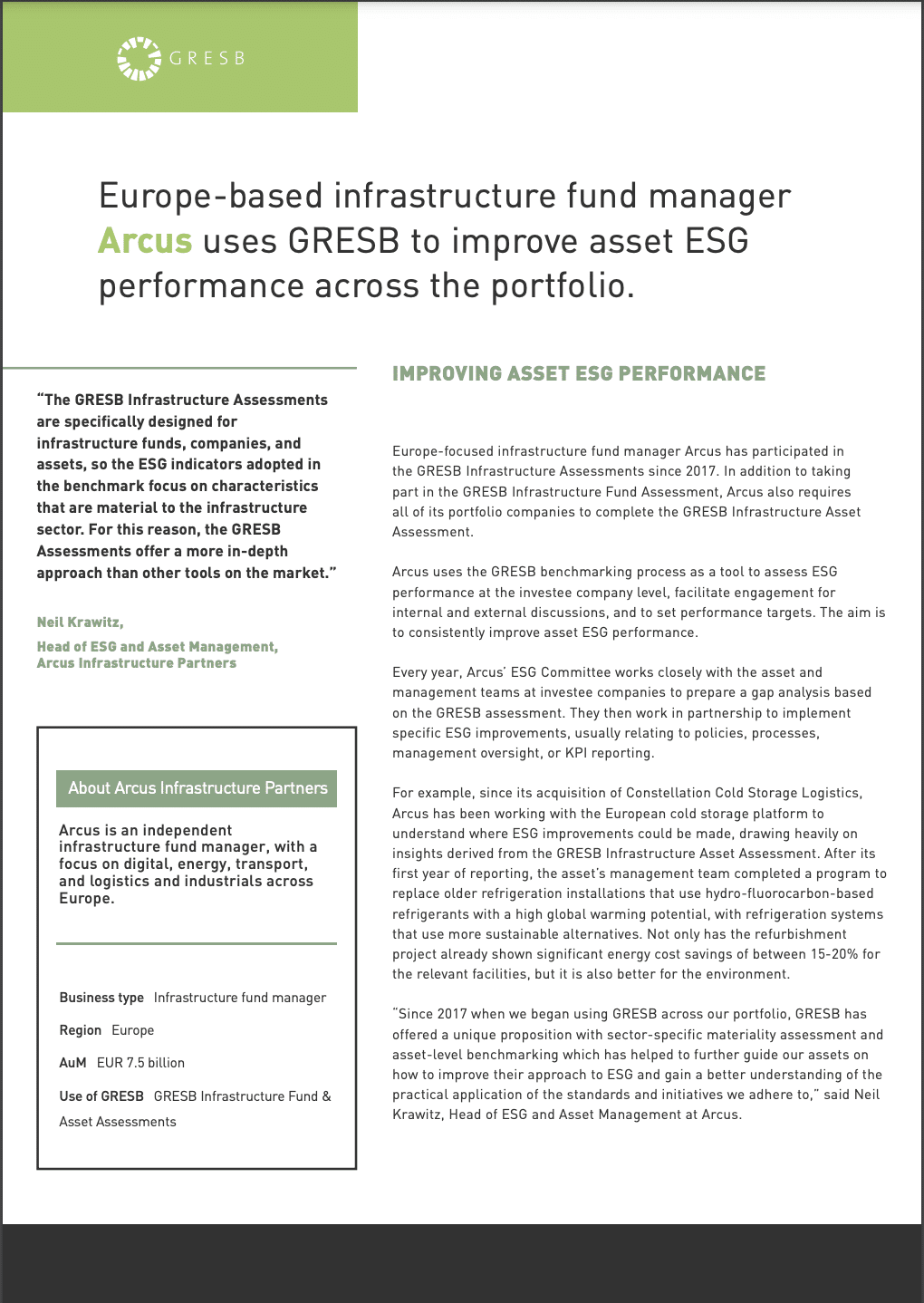Europe-based infrastructure fund manager Arcus uses GRESB to improve asset ESG performance across the portfolio.

Arcus is an independent infrastructure fund manager, with a focus on digital, energy, transport, and logistics and industrials across Europe.
Business type: Infrastructure fund manager
Region: Europe
AuM: EUR 7.5 billion
Use of GRESB: GRESB Infrastructure Fund & Asset Assessments
Improving Asset ESG Performance
Europe-focused infrastructure fund manager Arcus has participated in the GRESB Infrastructure Assessments since 2017. In addition to taking part in the GRESB Infrastructure Fund Assessment, Arcus also requires all of its portfolio companies to complete the GRESB Infrastructure Asset Assessment.
Arcus uses the GRESB benchmarking process as a tool to assess ESG performance at the investee company level, facilitate engagement for internal and external discussions, and to set performance targets. The aim is to consistently improve asset ESG performance. Every year, Arcus’ ESG Committee works closely with the asset and management teams at investee companies to prepare a gap analysis based on the GRESB assessment. They then work in partnership to implement specific ESG improvements, usually relating to policies, processes, management oversight, or KPI reporting.
Every year, Arcus’ ESG Committee works closely with the asset and management teams at investee companies to prepare a gap analysis based on the GRESB assessment. They then work in partnership to implement specific ESG improvements, usually relating to policies, processes, management oversight, or KPI reporting.
For example, since its acquisition of Constellation Cold Storage Logistics, Arcus has been working with the European cold storage platform to understand where ESG improvements could be made, drawing heavily on insights derived from the GRESB Infrastructure Asset Assessment. After its first year of reporting, the asset’s management team completed a program to replace older refrigeration installations that use hydro-fluorocarbon-based refrigerants with a high global warming potential, with refrigeration systems that use more sustainable alternatives. Not only has the refurbishment project already shown significant energy cost savings of between 15-20% for the relevant facilities, but it is also better for the environment.
“Since 2017 when we began using GRESB across our portfolio, GRESB has offered a unique proposition with sector-specific materiality assessment and asset-level benchmarking which has helped to further guide our assets on how to improve their approach to ESG and gain a better understanding of the practical application of the standards and initiatives we adhere to,” said Neil Krawitz, Head of ESG and Asset Management at Arcus.
The Importance of an Industry-Specific Framework
As an experienced infrastructure fund manager, Arcus is acutely aware of the importance of having a framework that is both industry-specific and aligned with other reporting standards.
“The GRESB Infrastructure Assessments are specifically designed for infrastructure funds, companies, and assets, so the ESG indicators adopted in the benchmark focus on characteristics that are material to the infrastructure sector. For this reason, the GRESB Assessments offer a more in-depth approach than other tools on the market,” said Krawitz.
“There is a vast offering of ESG reporting standards on the market that co exist alongside one another, each focusing on different elements of the ESG spectrum. For an investment business like Arcus, it is key to have exposure and participation across multiple applicable standards. Where the indicators overlap from one standard to another, it is beneficial for the definition of these indicators to be aligned to limit the amount of data collection and improve transparency. Through the alignment with other recognized ESG frameworks GRESB reduces the time spent on reporting,” he concluded.
Building Sustainable Infrastructure
Arcus strongly believes that decarbonizing and greening the infrastructure sector is crucial to creating a more sustainable world.
“The provision of high-quality infrastructure is critical to Europe’s future economic growth, environmental protection, societal development, and the reduction of inequalities. ESG considerations are critical when investing in infrastructure as these assets are generally shared community resources with many daily dependents – meaning that good ESG management is even more important than for most economic activities,” stated Krawitz.
In addition to being a GRESB member and active participant, Arcus is also a signatory to the Principles for Responsible Investment, the Taskforce for Climate-related Financial Disclosure, and United Nations Global Compact, and supports eleven of the Sustainable Development Goals on which its operations are most likely to have the greatest impact.